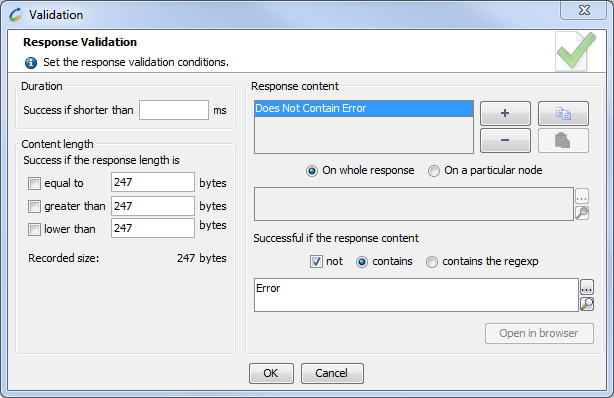Validation
Allows adding assertions to the server responses to check their validity. The validity of the content returned by the server may be checked using the following criteria: delay, page size or page content.

Validation cannot be applied to failed requests (HTTP error, network error, and so on).
Duration
Specifies the maximum delay tolerated in ms.
Content Length
Defines the exact, minimum and maximum sizes of the server response body. HTTP header lengths are disregarded. The default length is the length of the server response content at the time of recording. Greater than denotes greater than or equal to; Lower than denotes smaller than or equal to.
Response Content
Checks whether or not the server response contains a certain content. The server response is considered valid if all the content conditions are satisfied.
Depending on the type of HTTP response, the validation can be based on:
- the response as a whole: the validation check will be carried out on the HTTP responses headers and body. This is the default option.
- a particular node: the validation check will be carried out on one of the nodes in the response body. This node is defined using an XPath expression. This option is only used for XML and HTML responses, as well as for SOAP, GWT, Adobe Flex/AMF, Oracle Forms, Java Serialization, RTMP and Siebel responses.
The conditions available are:
- contains: checks if the body of the server response contains the specified text (example: <span class="welcome">Welcome</span>).
- contains regular expression: checks if the body of the server response contains the specified regular expression (example: <span class="welcome">Welcome \w+ \w+ </span>).
Note that the content assertion may contain variables.
See Regular expressions.